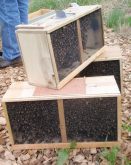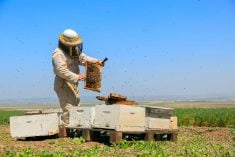Despite efforts to bring in international workers, vegetable growers and beekeepers are still severely understaffed, according to provincial numbers.
“I’m hurting not having my help,” said Mark Friesen, chair of the Manitoba Beekeepers Association.
Friesen’s Canadian employee is living abroad and hasn’t been able to get back into the country, he said.
As of May 11, according to numbers Friesen received from Manitoba Agriculture and Resource Development staff, 35 international workers have arrived in Manitoba to work in beekeeping out of an expected 107. Another 19 were anticipated, but their flight was delayed.
Read Also

Canada’s import ban on Avix bird control system ruffles feathers
Canadian producers’ access to Bird Control Group’s Avix laser system remains blocked despite efficacy studies and certifications, as avian flu deaths rise.
Vegetable growers anticipated 477 international workers and have received 207 as of May 11, MARD said. Another 50 were anticipated.
Canada has exempted temporary foreign workers from border closures, but logistical issues like difficulty getting flights, safety concerns from their home countries, and slow processing of paperwork have delayed workers’ arrival.
“Yes, things have progressed and we have on-again off-again plans to get our workers in for the season,” Friesen said in an email to the Co-operator on May 13. “The latest expectation is that the new flights from Managua are planned to arrive; they are being delayed due to new flight crew measures being implemented in Nicaragua.”
Portage-area vegetable grower Sam Connery said her farm has about two-thirds of its usual international workers as of May 14. Most were still in their 14-day quarantine period and could not work.
Usually they’d be starting work about now, she said.
“Thank goodness for the late spring,” Connery said.
Connery said many Mexican workers can’t get necessary paperwork in order because government offices are closed and staff are working from home. The country has started implementing online form services, she said, which she hoped would help.
Connery said her farm is advertising job openings online, but she hasn’t got many applications.
They haven’t made plans to reduce production yet, she added. They’re still holding out hope they’ll get the employees they need.
At the end of April, nearly 22,000 international agricultural workers had arrived in Canada, according to a May 12 statement from Marie-Claude Bibeau, the federal minister of agriculture. This compares to about 25,500 by the end of April in 2019.
“All the federal departments involved in the Temporary Foreign Worker program worked together to simplify processes and facilitate as much as possible the safe entry of these workers,” said Bibeau.
The federal government has introduced measures to encourage Canadians to fill agricultural jobs. At the beginning of April, the Canada Summer Jobs program was briefly reopened to applications from farms and other essential employers.
This saw some uptake in Manitoba, with around 50 farmers applying for student help, according to information obtained by the Co-operator.
The “Step up to the Plate — Help Feed Canadians” job portal was also launched to match Canadians with jobs in the agri-food sector.


















